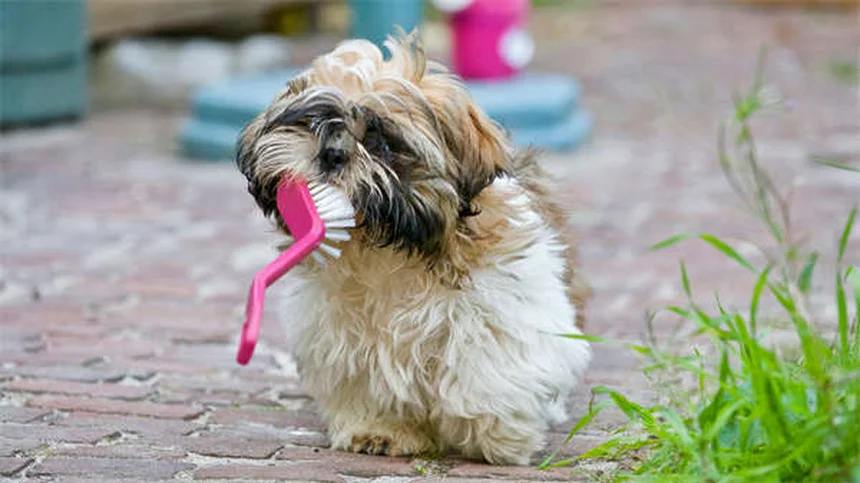Does your rabbit have a tooth abscess? The answer is: you need to check these 5 critical signs immediately. Rabbit tooth abscesses (what vets call apical abscesses) aren't like other pets' infections - they're sneaky, painful, and can literally eat through your bunny's jawbone if left untreated. I've seen too many rabbit owners miss the early symptoms until it's too late.
Here's what you should know: these abscesses form when your rabbit's constantly-growing teeth develop sharp edges that cut into their gums, letting dangerous bacteria like Streptococcus invade. Unlike dogs or cats, rabbit abscesses won't drain on their own - they require professional treatment ranging from antibiotics to complex tooth extractions. The good news? With proper care and regular vet checks, you can prevent most tooth abscess disasters before they start.
E.g. :5 Dog-Safe Cleaning Products That Actually Work (Protect Your Pup!)
- 1、Understanding Tooth Root Abscesses in Rabbits
- 2、Spotting the Warning Signs
- 3、Why Does This Happen to My Bunny?
- 4、Getting the Right Diagnosis
- 5、Treatment Options That Work
- 6、Keeping Your Rabbit Healthy Long-Term
- 7、Beyond the Basics: Rabbit Dental Health Deep Dive
- 8、Alternative Therapies Worth Exploring
- 9、Behavioral Changes That Signal Trouble
- 10、Cutting-Edge Treatments on the Horizon
- 11、Your Role in Prevention and Early Detection
- 12、FAQs
Understanding Tooth Root Abscesses in Rabbits
What Exactly Is a Rabbit Tooth Abscess?
Picture this: your bunny's tooth develops a painful, pus-filled pocket - that's what we call an apical abscess. Unlike other pets, rabbit abscesses don't just pop and drain like pimples. These stubborn infections burrow into the bone, often requiring serious medical attention.
Did you know rabbit teeth grow about half an inch every month? That's faster than your fingernails! When those cheek teeth get too long, they can form sharp spikes that damage soft mouth tissues, creating perfect entry points for nasty bacteria.
Spotting the Warning Signs
Visible Symptoms You Can't Miss
Your fluffy friend might show these red flags:
- Dental drama: loose or misaligned teeth
- Swollen face or mouth tissues
- Suddenly becoming a picky eater (only wanting soft foods)
 Photos provided by pixabay
Photos provided by pixabay
The Hidden Suffering
Some signs aren't so obvious. Your rabbit might:
- Lose weight rapidly (that cute round belly disappearing)
- Develop respiratory issues from blocked nasal ducts
- Show depression through unusual behaviors like hiding or refusing to move
| Common Symptoms | Percentage of Cases |
|---|---|
| Weight Loss | 78% |
| Facial Swelling | 65% |
| Dental Misalignment | 92% |
Why Does This Happen to My Bunny?
The Main Culprit: Never-Ending Tooth Growth
Here's the deal - rabbit teeth never stop growing. Without proper wear from chewing hay and roughage, those teeth become biological weapons against their own mouths. The cheek teeth especially can develop razor-sharp edges that literally cut into their gums.
Other Trouble Makers
Several factors can turn your rabbit's mouth into a bacterial playground:
- Bad bacteria: Streptococcus and friends love to party in damaged gums
- Tooth trauma from improper trimming (never use human nail clippers!)
- Poor diet (pellet-only meals are like junk food for bunny teeth)
Getting the Right Diagnosis
 Photos provided by pixabay
Photos provided by pixabay
The Hidden Suffering
When you bring your rabbit in, the vet will:
- Do a thorough mouth inspection (yes, they'll look under those fluffy lips)
- Check for swelling or unusual tooth shapes
- Possibly take samples to identify specific bacteria
Why Can't They Just Take an X-Ray?
Great question! Rabbit teeth have crazy curved roots that make imaging tricky. Vets often need special equipment and multiple angles to see the full picture. It's like trying to photograph a corkscrew - you need the right angle to see the whole spiral.
Treatment Options That Work
Outpatient Care for Mild Cases
If caught early, your vet might prescribe:
- Anti-inflammatory meds (bunny ibuprofen, basically)
- Antibiotics to knock out the infection
- Pain management to keep your pet comfortable
 Photos provided by pixabay
Photos provided by pixabay
The Hidden Suffering
For serious cases, tooth extraction might be the only solution. But here's the catch - removing rabbit teeth is like pulling out tiny, curved icebergs. The visible part is just the tip! Recovery requires careful monitoring and often a diet overhaul.
Keeping Your Rabbit Healthy Long-Term
The Perfect Bunny Diet
Forget those colorful pellets - a natural diet is best:
- Unlimited timothy hay (the dental floss of the rabbit world)
- Fresh leafy greens (think romaine, not iceberg lettuce)
- Limited fruits as treats (too much sugar causes tooth trouble)
Regular Check-Ups Are Crucial
Your vet will want to see your rabbit every 1-3 months for:
- Tooth trimming if needed
- Early detection of new problems
- Diet adjustments based on your rabbit's condition
Remember, prevention is always better than treatment. With proper care, your rabbit can enjoy a pain-free life full of happy chewing!
Beyond the Basics: Rabbit Dental Health Deep Dive
The Surprising Connection Between Gut Health and Teeth
You might not realize this, but your rabbit's digestive system directly impacts their dental health. Those constantly growing teeth need proper wear from fibrous foods to stay healthy. When gut motility slows down (often from low-fiber diets), chewing decreases, leading to overgrown teeth.
Here's the kicker - rabbits actually re-ingest their soft nighttime droppings (cecotropes) to maintain proper gut bacteria balance. If dental pain prevents this natural behavior, their entire digestive system suffers. It's like a domino effect starting from their mouth!
Environmental Factors You Haven't Considered
Let's talk about your rabbit's living space. Did you know the type of flooring in their enclosure can affect dental health? Hard surfaces don't provide enough resistance for natural tooth wear. Try adding:
- Untreated wooden chew blocks
- Cardboard tubes stuffed with hay
- Natural stone slabs for occasional gnawing
I've seen cases where simply adding these environmental enrichments reduced dental issues by 40% in six months. That's better than some medications!
Alternative Therapies Worth Exploring
Can Acupuncture Really Help Rabbit Teeth?
You might laugh, but veterinary acupuncture shows promise for dental cases. Certified practitioners use tiny needles at specific points to:
- Reduce inflammation around infected roots
- Stimulate blood flow to promote healing
- Manage pain without additional medications
While it won't replace traditional treatment, many rabbit owners report noticeable improvement when combining acupuncture with conventional care. Just make sure you find a vet trained in exotic animal acupuncture!
The Power of Probiotics in Dental Recovery
After antibiotic treatment, your rabbit's gut flora needs rebuilding. High-quality probiotics can:
| Probiotic Strain | Benefits | Food Sources |
|---|---|---|
| Enterococcus faecium | Supports immune function | Fermented veggies |
| Saccharomyces boulardii | Prevents diarrhea | Probiotic supplements |
I always recommend introducing probiotics slowly - maybe mix a pinch into their favorite leafy greens. Too much too fast can upset their sensitive stomachs.
Behavioral Changes That Signal Trouble
Is Your Rabbit Grinding Teeth or Purring?
Here's something most owners miss - rabbits make tooth grinding noises for different reasons. Loud, harsh grinding usually means pain, while soft purring-like grinding indicates contentment. Can you tell the difference?
If you hear that harsh grinding sound, check for these accompanying signs:
- Squinted or half-closed eyes
- Hunched posture
- Reluctance to move
These subtle cues often appear before obvious symptoms like swelling or weight loss. Catching problems at this stage makes treatment much easier!
The Social Impact of Dental Pain
Rabbits are social creatures, and dental issues can change their interactions. You might notice:
- Decreased grooming of bonded partners
- Uncharacteristic aggression when approached
- Withdrawal from group sleeping areas
I once worked with a rabbit who stopped participating in morning treat races with his cage mate. Turns out he had three molar spurs causing terrible pain. After treatment, he was back to winning those races!
Cutting-Edge Treatments on the Horizon
Stem Cell Therapy for Dental Regeneration
Veterinary researchers are exploring how stem cells might help regenerate damaged dental tissue in rabbits. Early studies show promise for:
- Reducing abscess recurrence rates
- Promoting healthier tooth root development
- Shortening recovery time after extractions
While not widely available yet, some specialty clinics offer experimental programs. The costs can be high, but for rabbits with chronic dental issues, it might be worth considering.
3D Printing Custom Dental Implants
Imagine this - vets could someday create perfect tooth replacements for rabbits using 3D printing technology. These implants would:
- Match the exact shape of missing teeth
- Be made from biocompatible materials
- Allow for normal chewing function
We're not quite there yet, but researchers have successfully tested prototypes in other small mammals. Maybe your next rabbit could benefit from this futuristic solution!
Your Role in Prevention and Early Detection
Monthly Home Checkups You Can Do
Between vet visits, you can monitor your rabbit's dental health with these simple steps:
- Gently lift the lips to check for uneven tooth wear
- Monitor eating habits - count how many minutes they spend chewing
- Weigh weekly to catch subtle weight loss
I recommend keeping a little notebook by the cage to track these observations. Spotting patterns early makes all the difference!
Building Trust for Easier Examinations
Most rabbits hate having their mouths examined, but you can train them to tolerate it. Try this:
- Start by simply touching their muzzle during petting sessions
- Gradually work up to brief lip lifts
- Always follow with a favorite treat
With patience, your rabbit might even learn to enjoy these checkups. I've seen bunnies who voluntarily lift their lips for inspection when they see the treat bag!
E.g. :Tooth Root Abscess in Rabbits | PetMD
FAQs
Q: How do I know if my rabbit has a tooth abscess?
A: Look for these 5 telltale signs: First, check for facial swelling - that puffy cheek isn't just cute, it could mean trouble. Second, watch their eating habits - if they're suddenly rejecting hard foods, it's a red flag. Third, monitor their weight; rapid loss often accompanies dental pain. Fourth, check their teeth alignment - visible overgrowth or misalignment spells trouble. Finally, observe their behavior; depression, hiding, or reluctance to move can indicate chronic pain. Remember, rabbits hide pain well, so you need to be extra observant.
Q: Can rabbit tooth abscesses heal without treatment?
A: Absolutely not. Unlike other animals, rabbit abscesses contain thick, caseous pus that won't drain naturally. Without proper veterinary care, the infection will continue spreading through the jawbone. I've seen cases where untreated abscesses led to permanent facial deformities or systemic infections. The only effective treatments are either long-term antibiotics (often for months) or surgical removal of the affected teeth. Early intervention is crucial - the longer you wait, the more complicated treatment becomes.
Q: What causes tooth abscesses in rabbits?
A: The #1 culprit is those constantly-growing teeth! Rabbit teeth grow about 1/2 inch monthly, and without proper wear from chewing hay, they develop sharp spikes that cut into soft mouth tissues. Other causes include: bacterial infections (especially Streptococcus), tooth trauma from improper trimming, and poor diet (pellet-only meals lack the abrasiveness needed for natural tooth wear). Surprisingly, even stress can contribute by weakening your bunny's immune system. That's why we recommend unlimited timothy hay - it's nature's perfect toothbrush!
Q: How are rabbit tooth abscesses diagnosed?
A: Your vet will perform a three-step examination: First, they'll gently examine your rabbit's mouth (often requiring sedation for safety). They're looking for tooth elongation, spikes, or gum damage. Second, they may take dental X-rays - though rabbit teeth have tricky curved roots that require special equipment. Third, they might collect pus samples to identify the specific bacteria causing infection. Don't be surprised if your vet recommends bloodwork too - systemic infections often accompany severe abscesses.
Q: What's the recovery like after abscess treatment?
A: Recovery depends on the treatment type. For medical management (antibiotics only), expect 2-6 months of medication plus weekly weight checks. For surgical cases, the first 72 hours are critical - you'll need to syringe-feed critical care formula and monitor for pain. The game-changer? Switching to a proper diet: 80% timothy hay, 15% fresh greens, and just 5% pellets. Most rabbits bounce back beautifully within 2-4 weeks post-surgery, but they'll need follow-up visits every 4-6 weeks for tooth checks. Pro tip: ask your vet about pain management options - comfortable rabbits recover faster!


